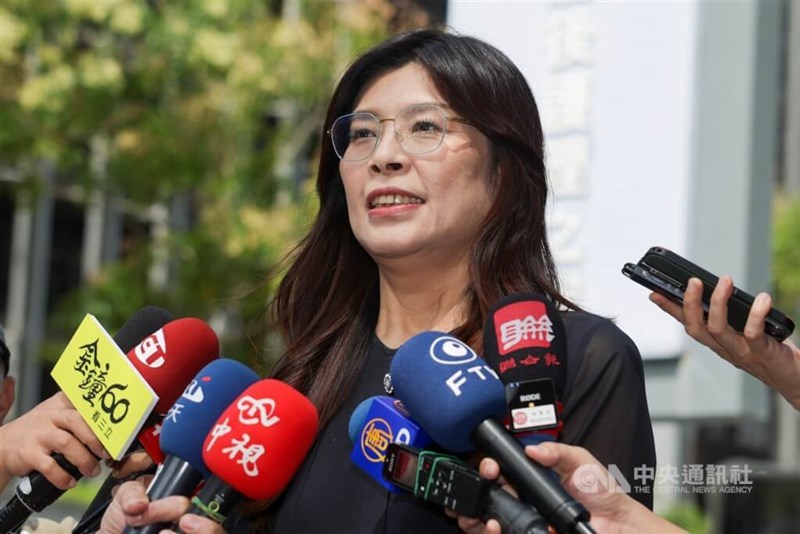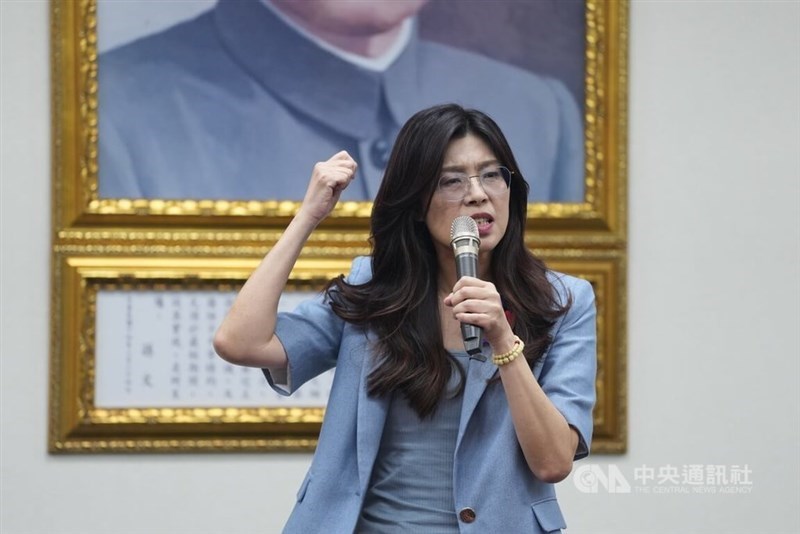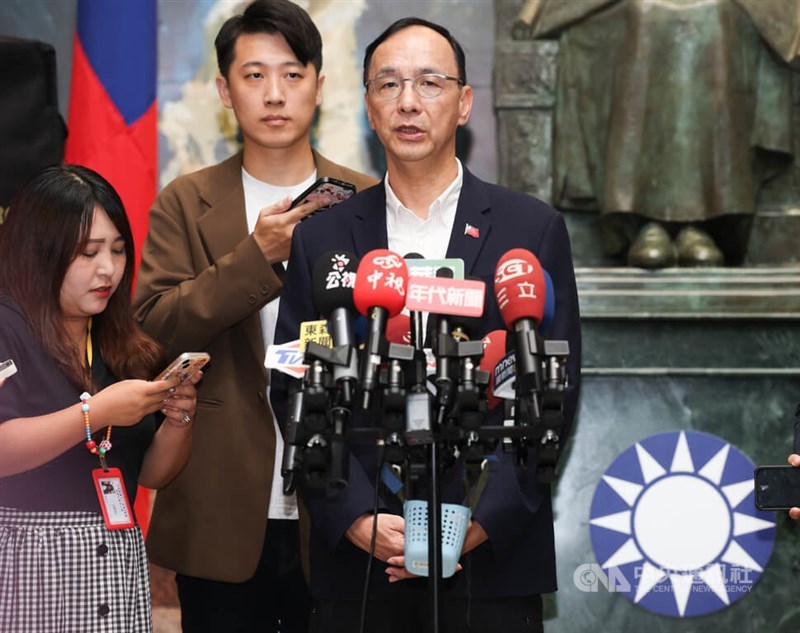
Taipei, Oct. 20 (CNA) After emerging as the Kuomintang's (KMT) chair-elect on Saturday amid doubts over her ties to China, Cheng Li-wun (鄭麗文) said she is willing to do everything to promote peace across the Taiwan Strait, including meeting Chinese President Xi Jinping (習近平).
"As long as it addresses cross-strait conflicts and disagreements, promotes peace and cooperation, and brings about common prosperity, I am willing to take on all responsibilities and meet anyone," Cheng said during a radio interview Monday.
Cheng, who served two terms as a KMT legislator-at-large, won more than 50 percent of the vote to become the second elected female leader of Taiwan's major opposition party. Monday's radio program was her first public interview since being elected chairperson.
"This is the defining difference between the stances of the KMT and the Democratic Progressive Party (DPP): We hope [Taiwan and China] will make peace with each other, but the DPP seems to keep touching the red lines of independence, of two countries -- continues to provoke [Beijing] and highlight military conflict," she said.
Oct. 18: Newly elected KMT chair Cheng Li-wun urges DPP to drop 'anti-China card'
Citing a United Daily News survey on cross-strait relations released in late September, which showed that 63 percent of respondents were dissatisfied with President Lai Ching-te's (賴清德) related policies, Cheng said the DPP's "anti-China card" had led Taiwan into a cul-de-sac.
In this regard, she said the KMT's most important task is to "gather mainstream public support within Taiwan," which can be elevated to a higher level under a KMT-led administration.
"The more public support you have behind you, the more meaningful your visit to [China] will be; otherwise, you're visiting on behalf of yourself or a small group," she said.
On Sunday, the KMT said it received a congratulatory letter from Xi in his capacity as secretary-general of the Chinese Communist Party, in which he acknowledged both parties' adherence to the "1992 consensus" over the years and expressed hope that they can "work together to push for the unification of the country."

In her reply to Xi, Cheng reiterated her party's opposition to Taiwan's independence and emphasized peace and prosperity under the "1992 consensus," but did not echo the "unification" call.
The "1992 consensus" refers to a tacit understanding reached between the then-KMT government and Beijing. The KMT interprets it as an acknowledgment by both sides that there is only "one China," with each side free to define what "China" means.
The DPP has never recognized the "1992 consensus," arguing that Beijing allows no room for interpreting "China" as the Republic of China, and that accepting the consensus would imply agreeing to China's claim of sovereignty over Taiwan.
On Monday, Lai said it is "impossible to achieve peace merely with a signed agreement" or through the "1992 consensus," as he defended Taiwan's growing defense budget while addressing an annual conference of the Overseas Community Affairs Council.
Cheng also confirmed Monday that she had received a congratulatory message from Huang Kuo-chang (黃國昌), chairman of the Taiwan People's Party (TPP), the other opposition party, but not from Lai, who heads the DPP. She described those messages as "friendly gestures," regretting that Lai had missed an opportunity to "offer an olive branch" despite his stated intent to unite the ruling and opposition camps.
In response to Cheng's victory, outgoing KMT Chairman Eric Chu (朱立倫) called on party members to unite, while incumbent legislative caucus whip Fu Kun-chi (傅崐萁) said he would work with Cheng as he did with Chu.

Cheng came under fire over her ties to China in her bid for the KMT chair -- not from the DPP, but from the party's 2024 vice-presidential candidate, Jaw Shau-kong (趙少康), who accused Beijing of meddling in the election and favoring her.
Oct. 18: China policy, opposition unity will be Cheng's main challenges: KMT sources
She said such emotional remarks are inevitable during elections, adding that she is unafraid of the Lai administration's "pro-China" accusations or the threat of possible prosecution.
On foreign relations, Cheng said her principles are "equity, respect, and reciprocity," stressing that "Taiwan must prioritize its own interests" while navigating between China and the United States. Issues such as Taiwan Semiconductor Manufacturing Co. (TSMC), the world's largest contract chipmaker, and arms purchases from Washington are no exception, she added.
While reiterating her gratitude for U.S. assistance during Taiwan's hardest times, Cheng said, "That does not mean the U.S. can treat Taiwan like an ATM." She described the military budgets pledged by Lai -- NT$945 billion this year and a projected 5 percent of GDP by 2030 -- as "unreasonable" and "unaffordable."
Cheng rejected the "pro-China" label often used by foreign media to describe the KMT, saying it only serves to reinforce "old biases and stereotypes."
"Now that you've heard so much from me, in your opinion, am I pro-China, anti-China, pro-U.S., or anti-U.S.?" she asked.
-
Society
Qingjing Farm to pay compensation for horse that mangled child's ear
03/02/2026 05:15 PM -
Business
U.S. dollar closes sharply higher on Taipei forex market
03/02/2026 04:26 PM -
Business
Taiwan shares end down amid escalating Middle East uncertainty
03/02/2026 04:17 PM -
Culture
Annual Yanshui Beehive Fireworks Festival opens in Tainan
03/02/2026 04:09 PM -
Politics
U.S. APEC official in Taiwan for bilateral talks: AIT
03/02/2026 03:51 PM